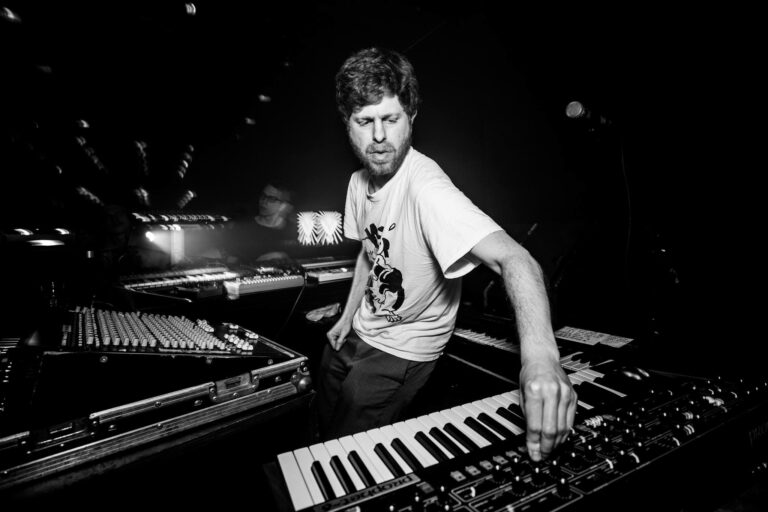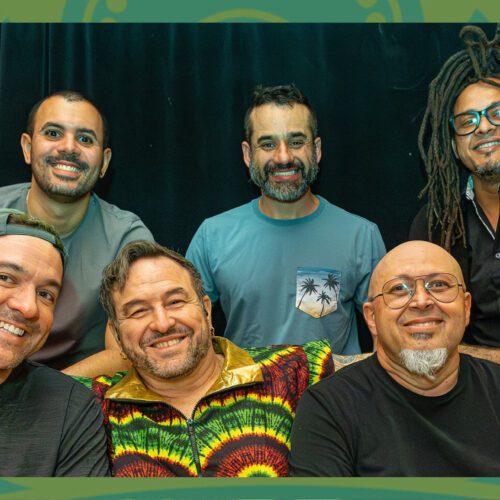Additional Information
Where do I begin? Jordan GCZ is a name that has resonated in the electronic music scene for decades. Since his debut in 1999 with Optisimo (Fact Records) Jordan’s career has been marked by his effortlessly capacity to glide between house, deep house, ambient, jazz-infused soundscapes as well by an impressive string of achievements. His deep love for Detroit techno has been a guiding force, leading to collaborations with pioneers like Terrence Dixon and remixes by Robert Hood. The Ohio’s native is also known for his collaborative projects, including Juju & Jordash with Gal Aner and Magic Mountain High, adding Move D in the mix. You may have caught them at MUTEK respectively in 2013 and 2014.
Jazz has always been a significant influence on Jordan’s work, deeply influencing his creative and performance processes, which are almost entirely rooted in improvisation. After spending the last 20 years building his career in Amsterdam, the producer has recently relocated to Toronto. Which brings us to MUTEK Montreal, where he will be playing live on Tuesday 20th August, at l’Esplanade Tranquille, after Duchesse and before Mathew Jonson. You don’t want to miss it.
PAN M 360: What kind of music did you grew up listening to?
Jordan GCZ: I was following the British pop charts religiously. I was very much into pop, electro pop, what was very common like Duran Duran, Pet Shop Boys. I really was obsessed. I was one of those kids with a Walkman on my ear all day. I was lucky to grow up in the 80’s, I’m sure that on in on some level, hearing so many synthesizers early on made me want to get into synthesizer music and electronic music.
PAN M 360 : What was the first music scene you remember being engaged in by going to concerts, buying cassettes or records?
Jordan GCZ: In my early teens, I was more into punk and industrial. I was really into Bauhaus and then a little I got into more American stuff. I was into Sonic Youth, even Skinny Puppy, The Cure… I was one of these depressed gothy teenagers. I would go out to hear that kind of music, but always loved synthesizers and I played keyboards in a band.
PAN M 360: How did you transition from playing in a band to becoming a producer and starting your own journey?
Jordan GCZ: Technology played a big part in that. I got my first synthesizer when I was 13, and soon after, I got a four-track cassette recorder. I never really loved being in a band, I always wanted to do my own thing. Once I had the recorder, I could start making my own music. By the time I was 16 or 17, I had a couple of synthesizers and started gathering more equipment. I also started using a computer to record music, which opened up even more possibilities. I was really into jazz as well, which is a bit different, but it all came together for me.
PAN M 360: It’s fascinating how the rise of home studios allowed so many people to create music. How did that impact your approach to making music?
Jordan GCZ: The ability to make music at home was a game-changer. When I was around 18, I discovered American techno from Detroit and house music from Chicago. I fell in love with the jazzy elements of Detroit techno—it had the raw, rhythmic elements of industrial music that I already loved, combined with the musicality of jazz. It was the perfect genre for me at the time. I started making more dance music that incorporated those influences. I was just lucky that the timing was right, and it fit perfectly with what I was into.
PAN M 360: You lived in Amsterdam for quite a long time. How did that experience shape your music career?
Jordan GCZ: I spent about 19 years in Amsterdam, and during that time, my most successful project was Juju & Jordash with my partner Gal. We were both living in Amsterdam, and most of my gigs were with him during those years. We were fully dedicated to making music, recording albums, and touring almost every weekend. We developed our own thing, and improvisation was a big part of that. It’s something that I continue to focus on in my solo work as well.
PAN M 360: Improvisation is a central part of your work. How do you approach it when you’re working alone versus with someone else?
Jordan GCZ: Improvising alone is definitely different from improvising with someone else. When you’re with another person, you exchange ideas and react to each other, which makes it easier in some ways. But when you’re alone, you have to react to yourself, which can be more challenging. My process in the studio is similar to what I do on stage. It’s all about starting from nothing and seeing where the music takes me. The main difference is that in the studio, I can stay on one idea for a long time until it develops into something coherent. On stage, I need to keep things moving more quickly to keep the audience engaged.
PAN M 360: It sounds like you spend a lot of time preparing for your improvisations. What’s your approach to that preparation?
Jordan GCZ: It’s important for me to know my instruments inside and out. My setup has evolved over the years, but it’s been more or less the same since I started. I use very old technology – synthesizers and drum machines from the 80s. There’s no computer or laptop involved, I use sequencers that are part of the instruments, a monophonic synthesizer with a little monophonic sequencer, another one is a polyphonic synthesizer with a little polyphonic sequencer. I need to feel confident with it so I can focus on the music. I don’t want to spend time troubleshooting technical issues while I’m playing. My creative energy needs to go towards the music, not fixing gear.
PAN M 360: How do you handle situations where your gear doesn’t work or you have to use unfamiliar equipment?
Jordan GCZ: Those situations can be stressful, but they also lead to some interesting results. I’ve had gigs where everything went wrong with the gear, but somehow, we managed to pull through. One of my favorite albums that I put out came from a gig where all the gear stopped working, and we had to ask people on the internet to bring us synthesizers. It was nerve-wracking, but it worked out in the end. When I’m performing alone, I really need my setup to be reliable. Last year, I had a gig where I was supposed to play with a Terrence Dixon, but he got sick, so I had to perform alone with minimal gear. It ended up being a great experience because I knew my setup well enough to make it work.
PAN M 360: You recently moved to Canada. What motivated that decision, and how are you finding the music scene here?
Jordan GCZ: My partner and I were living in Amsterdam for my career, but during the pandemic, we realized that we didn’t want to be tied to that lifestyle anymore. My partner is from New Jersey, and I found out that since my mother is Canadian, I’m also Canadian. That opened up the possibility for us to move here. We visited Toronto and loved it. It was nice to finally live in the same city as some family after 20 years. As for the music scene, I haven’t been too involved yet. I’ve DJed a few times, but I haven’t played live here. We’ll see how it goes after my performance at Mutek.
PAN M 360: How do you feel about the future of your music career?
Jordan GCZ: I’m still passionate about music, but I’m going through a bit of a midlife crisis, trying to figure out what I want to do next. Music is still my main interest, along with my dog, but I need to decide how I want to make a living from it. I’ve started producing other artists, which I enjoy, but I might end up doing a bit of everything—performing, producing, teaching. We’ll see where it takes me.
PAN M 360: You’re talking about the diversification of revenue streams, and I found out that you started a Patreon page during the pandemic. How has that experience been for you?
Jordan GCZ: I started a Patreon page during the pandemic to teach producers and offer studio jams to subscribers. It was a good way to stay connected with people and help them develop their talent. But this past year, I’ve been less active on it, and I’m considering shutting it down. Teaching is great, but now that I can do it in person, I’m not sure if I’ll continue with Patreon.
PAN M 360: I’m asking because I’m also a Ph.D candidate in digital studies and sociomusicoly and I’m studying the effects of platforms like Patreon on the relationship between artists and fans. How do you see it?
Jordan GCZ: Patreon offers a more personal connection with fans, which is nice. It’s an extension of social media but more focused because it’s only for subscribers. People feel invested, and I feel more connected to them than I do with regular social media. It’s definitely interesting, but like everything, it has its pros and cons.
PAN M 360: What are your thoughts on the current state of the dance music scene?
Jordan GCZ: To be honest, the dance music scene has always had its flaws, but I feel like it’s gotten worse in the last five years. There’s not much room for artistry in dance music these days. Most festivals and clubs prioritize commercial success over creativity. It feels like it’s more about being successful and mainstream than being authentic. There are still places like Mutek that encourage creativity, but they’re rare.
PAN M 360: Don’t you think the rise of clubs implementing a no-phone policy on the dancefloor is a step in the right direction?
Jordan GCZ: I think it’s a step in the right direction, but I’m a bit cynical about it. A lot of clubs use the no-phone policy as a marketing tool rather than genuinely trying to improve the experience. They don’t surprise you at the club and say “Listen we have no phone policy”. It’s more like they go on Instagram and say “We’re now not allowing phones in come give us your money”. Maybe they do it now because it’s fashionable but in a year they’ll be like, “OK, look, we can bring our phones back”.
PAN M 360: You were talking about MUTEK being one of the rare place where creativity in encouraged: what can we expect from your performance?
Jordan GCZ: I am so excited to play this music. Over the past year, since moving to Canada, and especially after the pandemic, I’ve been questioning whether I still want to perform in nightclubs. I’m getting older, and the pandemic changed a lot of things for me. MUTEK felt like the perfect opportunity to explore how I feel about performing again—whether I want to return to that life, and if so, what kind of music I want to create. This gig gives me the chance to experiment and see where it takes me.
























